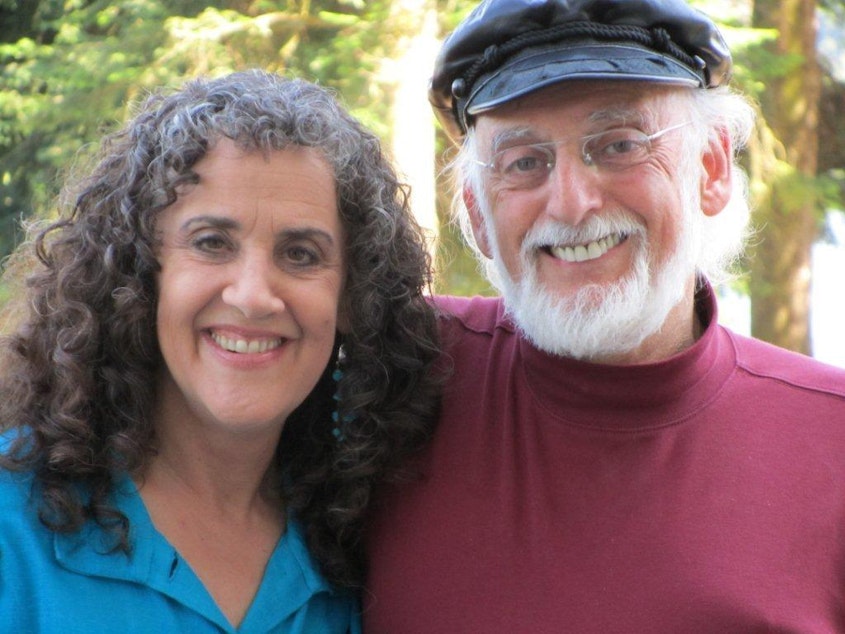Three hints your relationship is working, according to these researchers

In 1986, Dr. John Gottman set up a “Love Lab” at the University of Washington.
The goal was to research the behaviors of married couples, for better and worse. As the study progressed, to Gottman’s surprise, he and his team found they could predict with 94 percent certainty which couples would stay together and which would split.
The Gottmans at Town Hall Seattle
Listen to Drs. Julie and John Gottman in conversation with with KUOW's Bill Radke.
John Gottman and his wife Dr. Julie Gottman spoke at Town Hall in Seattle and answered questions we all want to know: Are we headed to divorce, or a long, happy marriage?
The four signs that a relationship isn’t doing well are, according to the Gottmans, criticism, contempt, defensiveness and stonewalling.
Julie Gottman said that even happy couples have bits of this, however. One difference between happy couples and miserable couples is how they repair disagreements or tough moments.
1.
“Happy couples make repairs after they criticize (their partner) and say, ‘I said that really badly, let me say that again in a different way,’” Julie Gottman said.
“If they’ve just gotten defensive, ‘Okay, wait a minute, I’m feeling defensive, can you say that in another way?’” she continued. “They make repairs along the way in the conversation.”
Happy couples will return to the fight they had and discuss what went wrong in the way they communicated, she said. They don’t go back to fight the argument all over again, in hopes of winning, but they try to understand what was going on with their partner that felt bad in the conversation.
“They process it,” she said.
2.
John Gottman said that in a great relationship, when one half is upset, the other will stop everything and tune in.
“When your partner is upset, even upset with you, but upset about anything, people communicate: ‘You know baby, when you’re upset, the world stops, and I listen,’” he said. “In relationships that don’t work, they communicate the opposite message: ‘When you’re upset, especially upset with me, go away. Get over it. Come to me when you are feeling better. And we’ll play together. We’ll have sex together.”
That dismissal is the kiss of death, he said.
3.
Julie Gottman said that it’s crucial to look at what your partner is doing right, not what they are doing wrong, and to express gratitude.
“Listen to your partner’s dreams and try to support those,” she said.
“Everybody has dreams. Everybody has values. Everybody is a philosopher. But everybody wants to have a sense of purpose and meaning in their life, and oftentimes their dreams are linked with that. So ask about that.”
Julie Gottman said that listening to one another is crucial. What are they going through? What is their distress?
“If we keep condemning them, or they condemning us, we end up even further apart,” she said.
A note on affairs: Affairs are often toxic to a relationship, and the Gottmans said they have created clinical training for those who have suffered from affairs.
They said that the betrayed often suffers from post-traumatic stress disorder, or PTSD.
“The images that come into your head, of the partner in bed with somebody else,” Julie Gottman said, “The suspicion, the fear, the anger, the ups and downs, the lack of sleep, the depression, all of that is part of PTSD. It’s a very painful thing.”
There is a way to heal, they said.
The first step is for the cheater to “express tremendous remorse and listen to the betrayed partner’s emotions.”
(Key point: Not the betrayed partner’s condemnations, but their emotions.)
//
Gottman and his wife Dr. Julie Gottman have channeled what they have learned into books and workshops that help couples better understand and improve upon their marriages.
Their latest book, co-written with Doug Abrams and Rachel Carlton Abrams, is “Eight Dates: Essential Conversations for a Lifetime of Love.”
The Gottmans are the co-founders of the Gottman Institute. He is professor emeritus of psychology at the University of Washington, and she is a clinical psychologist and clinical supervisor for the "Couples Together Against Violence" study.
Town Hall Seattle presented the Gottmans in conversation with KUOW’s Bill Radke at Temple De Hirsch Sinai on February 6. The event was part of their Civics series. KUOW’s Sonya Harris recorded the discussion.





